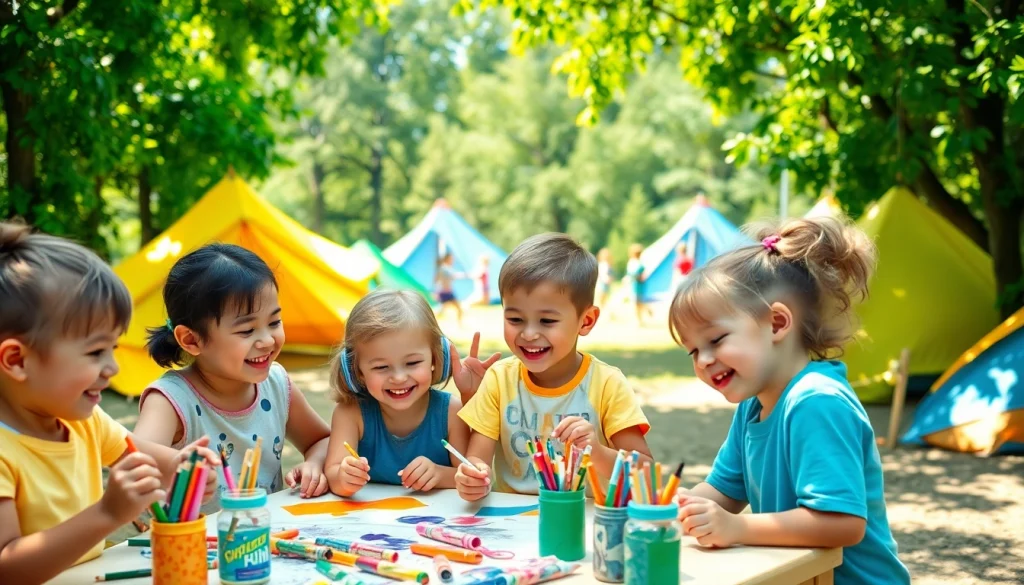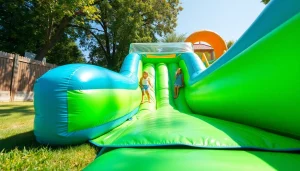
Understanding Holiday Camps
What Are Holiday Camps?
Holiday camps are structured programs typically designed for children and young people during school holidays. They offer an array of activities, ranging from arts and crafts to sports and educational workshops. While various types of holiday camps exist, their primary goal is to provide a safe and engaging environment where children can socialize, learn new skills, and enjoy new experiences. In the United Kingdom, holiday camps have a long-standing tradition, promoting both recreation and personal growth among participants. To explore some fantastic options, check out the holiday camps available for various audiences.
The Benefits of Attending Holiday Camps
Holiday camps offer a myriad of benefits to young attendees. One of the foremost advantages is the opportunity for socialization. Children from diverse backgrounds come together, fostering a spirit of inclusion and friendship that builds social skills. Moreover, holiday camps encourage physical activity, offering participants a chance to engage in sports and outdoor games that enhance physical fitness. Educational benefits are also significant; many camps introduce children to new subjects and skills through workshops and interactive experiences. They offer a structured setting where children can thrive, develop independence, and gain confidence away from their usual environment.
Different Types of Holiday Camps
Holiday camps can be categorized into several types, each catering to specific interests and needs:
- Adventure Camps: Focused on outdoor activities like hiking, camping, and canoeing, these camps provide thrilling experiences in nature.
- Arts and Crafts Camps: These camps concentrate on artistic pursuits, allowing children to explore their creativity through painting, sculpting, and various crafts.
- Sports Camps: Designed for young athletes, these camps provide coaching and training in specific sports, helping kids improve their skills while fostering teamwork.
- STEM Camps: Emphasizing science, technology, engineering, and mathematics, these camps offer hands-on learning experiences that inspire future innovators.
- Day Camps: Ideal for parents who prefer their children to return home in the evenings, these camps generally run during the daytime and offer similar activities as overnight camps.
Key Activities at Holiday Camps
Arts and Crafts Activities for Kids
Arts and crafts are fundamental components of holiday camps. These activities not only stimulate creativity but also enhance fine motor skills. Campers engage in various projects, from painting and drawing to making jewelry and 3D sculptures. Facilitators often provide structured lessons, ensuring that even those not particularly artistically inclined can cultivate their skills. The natural environment of a camp inspires creativity, offering subjects for painting or materials for crafting, such as leaves or stones.
Outdoor Games and Team Challenges
Outdoor games play a crucial role in developing teamwork and cooperation among campers. Activities like capture the flag, relay races, and obstacle courses encourage participants to work together towards a common goal. These games develop physical skills, such as coordination and endurance, while also enhancing social interactions. Team challenges build camaraderie, allowing for personal connections to flourish—an essential element of any successful holiday camp experience.
Educational Workshops and Nature Exploration
Many holiday camps provide educational workshops that encourage exploration and learning. Workshops might include science experiments, wildlife studies, or nature walks where children learn about ecosystems and biodiversity. These activities not only broaden knowledge but also instill a respect for the environment. Nature exploration fosters curiosity and a sense of wonder, crucial traits for children as they grow and develop a lifelong love for learning.
Choosing the Right Holiday Camp
Factors to Consider When Choosing a Camp
Selecting the right holiday camp for your child can seem daunting, but considering a few critical factors can streamline the decision-making process. First, assess the interests of your child. Whether they are inclined towards arts, sports, or outdoor adventure, the right camp should align with their passions. Next, consider the camp’s location—proximity can be essential for daily commuting. Other crucial factors include the camp’s length, reputation, and the availability of specific activities that your child may enjoy.
Daily Schedules and Camp Activities Overview
A typical day at a holiday camp can be structured with a variety of engaging activities. Mornings might start with group games, followed by workshops and arts sessions. After lunch, children might participate in outdoor excursions or sports, allowing time for socialization and physical activity. It’s beneficial for potential attendees to review sample schedules online or request them during enrollment discussions, ensuring that the camp matches their expectations and preferences.
How to Prepare Your Child for Holiday Camp
Preparation can enhance your child’s experience at camp. Begin by discussing what they should expect, focusing on the excitement of meeting new friends and engaging in fun activities. Role-play scenarios, emphasizing how to approach new experiences or interact with peers, can also alleviate anxiety. Ensure they pack appropriate gear, including clothing suited for various activities, personal items, and any medications they may need. Familiarizing them with the camp’s rules and schedule will also provide comfort and clarity as they embark on their holiday camp journey.
Safety and Well-being at Holiday Camps
Health and Safety Measures in Camps
Safety is paramount at holiday camps, and reputable programs implement comprehensive health and safety protocols. These may include first-aid training for staff, emergency response plans, and health assessments for campers. Camps typically ensure that all activities meet safety standards, particularly those involving physical exertion or outdoor adventures. Parents should inquire about these measures, providing peace of mind as children participate in various activities.
Staff Qualifications and Camper-to-Staff Ratios
The qualifications of camp staff play a pivotal role in ensuring a safe and enriching environment. It’s essential to choose camps with trained professionals who have experience in child development, safety protocols, and emergency response. Additionally, a favorable camper-to-staff ratio is critical for effective supervision and engagement. Staff should have the capacity to provide individual attention to campers, fostering a supportive atmosphere where children feel valued and heard.
Encouraging Positive Social Interactions
Encouraging positive social interactions is key to developing a harmonious camp environment. Staff should focus on fostering inclusivity, emphasizing teamwork and mentorship among campers. Activities designed for cooperative play and creating opportunities for conflict resolution are beneficial. Educating campers on empathy and respect can also establish a strong foundation for lifelong interpersonal skills, helping them communicate effectively and build healthy relationships both within and outside the camp environment.
Maximizing the Holiday Camp Experience
Tips for Parents: Staying Connected
Maintaining communication with your child during their holiday camp experience can help ease any feelings of homesickness. Many camps provide technology-free environments, encouraging face-to-face interactions amongst campers. However, some do allow brief communication through letters or scheduled phone calls. Parents can also stay in touch with camp leaders for updates on their child’s progress and wellbeing, ensuring an open line of communication throughout the camp period.
Creating Lasting Memories: Camp Projects
One of the highlights of attending holiday camp is the opportunity to create lasting memories. Camps often engage children in projects that can be taken home, such as craft items or photographs documenting their experiences. Encouraging kids to share their camp adventures with family can reinforce what they’ve learned and experienced, making for cherished memories that last long after the camp ends.
Feedback and Continuous Improvement for Camps
Feedback is vital for the continuous improvement of holiday camps. Gathering insights from campers and parents regarding their experiences—including what they liked and what could be improved—offers valuable information for camp administrators. These insights can lead to enhanced programming, safety measures, and ultimately a better experience for future attendees. Not only does this foster a culture of accountability, but it also strengthens the camp community as a whole.





